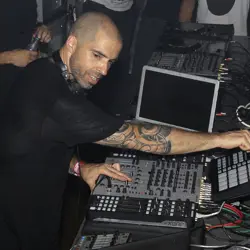 Chris Liebing
Chris LiebingTechno types are optimists. As 'futurists', they've kinda gotta be. And so German DJ/producer Chris Liebing isn't into doomsaying – not even in the face of the Eurozone crisis. "Economic troubles in Europe do not really affect the dance music scene so much, I've found," Liebing suggests. "I mean, if you look at countries like Italy, where the unemployment rate among the young people is between 25 and 30 percent, it seems as if people want to party and listen to music even more and use this as a way out of their daily lives. I think, by playing the music, we can even give people a different perspective on life – [show them] that not everything is about being successful in the material world but first of all being successful within your own world. I don't see a crisis – or economic crisis – as something necessarily bad... Of course, we go through troubles, and economic troubles, but things could be far worse. So I don't think that it's all as negative as the media wants to paint it."
Liebing is best known as the Godfather of Schranz – a '90s techno subgenre. In fact, he came up with the term himself to distinguish his hard style. "I wanted to point out the more distorted and dark nature of the music that I was into – and I basically called it 'schranz', which doesn't really have a meaning in German. A lot of people took this as a whole movement for a certain kind of techno – which seemed to become even faster than I initially wanted it to be. It was an amazing time – the music was quite fast, 140 to 144 BPM, with a lot of loops going on. But, at some point, we all got tired of all these loops and tired of the tempo, so we left that for a more bassy, slower and maybe even more sexy vibe."
The native of Giessen (near Frankfurt) discovered electronica as an '80s kid (he still loves listening to Depeche Mode). Liebing was DJing in the early '90s, then playing anything from pop to hip hop to house. He was gradually drawn to techno, promoting his own club, Spinclub. Liebing became a resident at Sven Väth's iconic Omen. Along the way, the sometime Eye Q Records staffer launched Fine Audio – and its successor CLR (Create Learn Realise). Liebing was one of the earliest DJ/producers to exploit the contentious digital format. In 2003 he released his first proper 'artist' album, Evolution. Liebing has also collaborated with Dutchman Speedy J, the two putting out Metalism as Collabs 3000 on NovaNute.
Today CLR is based out of Berlin, but Liebing lives in Frankfurt, where he also has his studio. He dedicates most of his time to others' music, being an adept engineer. "This is a lot of fun and quite time consuming so, at the moment, I don't get much time to work on my own music. But you go through phases – and right now I am totally fine with this phase." Above all, the veteran Liebing sees himself as "a newcomer". "Even today I feel that I am still exploring completely new ground, so I never really think that I have achieved something."
Don't miss a beat with our FREE daily newsletter
Liebing first toured Australia in 1996. Since then, techno has gone in and out of fashion in this country, as elsewhere, but it's now well represented at Australian dance festivals – despite the domination of electro-house. How healthy is the wider scene? "Well, you can argue how healthy it is for music to become more and more commercially successful. But, no matter how commercially successful it becomes, I think it's more important how grounded the artists stay and that they don't fall to the temptation to try to appeal to more and more people to make more money and stop doing it strictly from the heart. Music always goes through cycles and I think that at the moment it's an amazing time for electronic music worldwide. It is accepted as it has never been before – and this is generally a great thing."
















